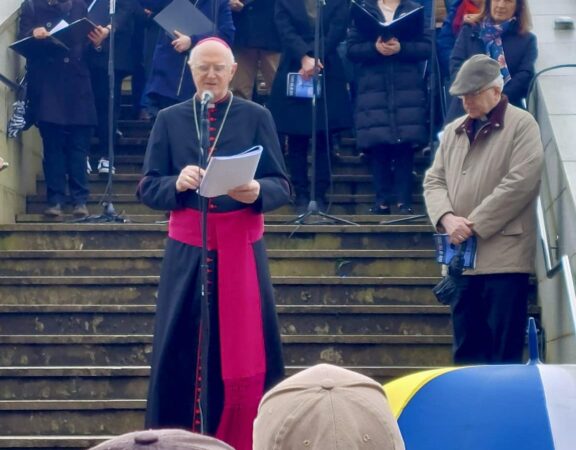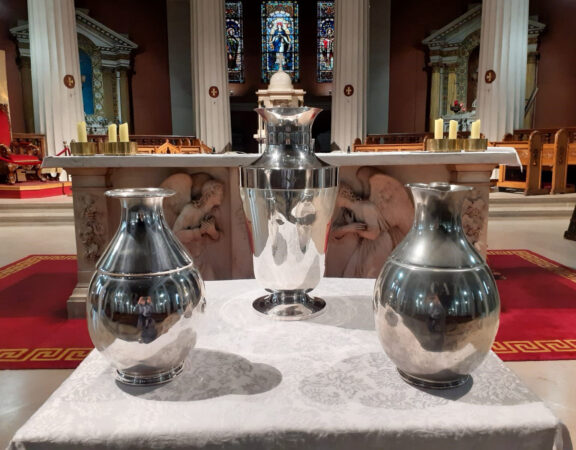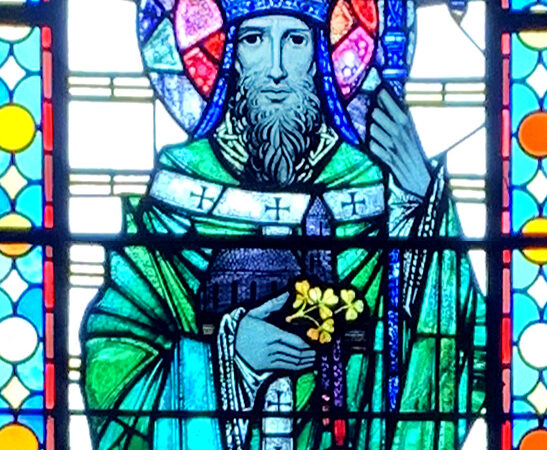Foundation Day of the Irish Spiritan Province
150 YEAR OF SPIRITAN PRESENCE IN IRELAND
150 YEAR OF SPIRITAN PRESENCE IN IRELAND
Homily Notes of
Most Rev. Diarmuid Martin
Archbishop of Dublin and Primate of Ireland
———–
Kimmage Manor, 28th October 2009
Most Rev. Diarmuid Martin
Archbishop of Dublin and Primate of Ireland
———–
Kimmage Manor, 28th October 2009
Over last weekend, the Irish College in Rome hosted an historical Seminar on Cardinal Paul Cullen, who was Archbishop of Dublin in the years from 1852 to 1878. The Seminar took a new look at the extraordinary changes that took place in the Irish Church under the leadership of Cullen.
When I spoke, some weeks ago, at the 150 anniversary of Blackrock College I drew attention to the extraordinary number of Churches, schools, catholic Hospitals and Institutions which were inaugurated in Cullen’s episcopate, something made all the more remarkable when you consider that this took place in the years immediately following the famine, where the memory of what took place, the poverty that ensued and the trauma in peoples hearts must have been still so strong.
Cullen, however, was not just a builder. He was a reformer. He re-established discipline in the Church and among the clergy. He used his influence to introduce a more outgoing, pastorally oriented – if somewhat likeminded – episcopate. He fought for and established a more effective system of education for all Catholics. He set out on the path for the establishment of a Catholic University of Ireland under Newman’s guidance.
Cullen was above all someone who wished to see a devotional reform, a renewal of piety among the people and during his time there was a remarkable increase in attendance at Churcgh services and the sacraments. He himself administered the sacrament of confirmation – a real re-initiation into the life of the Church – at times to over one thousand children and adults. He established the diocesan seminary in Dublin again with a strong stress on academic achievement and spiritual formation.
Cullen did not act on his own. During his episcopate there was a true rebirth of religious life in Ireland. The newly formed Irish religious orders of Sisters and Brothers became his allies in the challenge of renewal of Church life together with the many religious orders he invited or accepted into Dublin, bringing a variety of charisms which had until then not been able to flourish.
Among those who came from abroad were the Spiritans who came especially to be involved in education. It was Cullen’s hope to build around Newman’s Catholic University a network of schools which would provide a future elite of Catholic graduates well prepared then to enter as leaders into the evolving Irish society.
The first Spiritans to come to Ireland were a small group of highly talented and highly motivated men. Welcomed by the Carmelite Fathers, one of the Congregations which had maintained an almost continuous presence throughout the penal times, they began the establishment of what have become some of the most prestigious schools in the country, combining academic excellence, strong sporting traditions and a real vision of what a religious education involved for the students and for their lives in the future.
These were and are pioneering schools. Their pupils played a significant role in the building up of the Irish civil administration. They adapted over the years to many changes. I think of the pioneering work done by my predecessor Archbishop McQuaid during his time as President of Blackrock College. He was an outstanding educationalist. Change continues, and in recent years lay teachers have taken on growing responsibility for the running of the schools and the development of their charism.
At the same time the Spiritan charism took root in Irish society. The initial work of a small number of French priests blossomed forth into a unique experience in the Irish Church: hundreds of men responded to the call to the priesthood within the framework of the Spiritan charism and missionary spirit. History books will recall something of the phenomenon. No book could fully capture the impact that these men had on Irish education here at home but above all on the explosion of missionary work that spread out around the world from this very institution in Kimmage.
The Spiritan missionaries, as individuals and through their communities and structures, made a decisive impact on the evolution of the Church and the society of the countries in which they worked. The presence of various Ambassadors here this morning is an indication of the recognition that this work has attained.
Political, economic and religious leaders in a number of African countries were educated and formed by Irish Spiritans. Seminaries were built. A missionary style was developed which reached out to form new elites and at the same time was at home and loved in the poorest and more remote communities which encountered the joy of living the Catholic faith through the simple, hardworking, generous Irish Spiritan priest. The preaching of the word was accompanied by a strong sense of community building and attention to the weakest.
One hundred years after the coming of the Spiritan to Dublin, in the 1960’s when I was a seminarian in Clonliffe, I was one of the group of students who were designated to assist at the ceremonies of Archbishop McQuaid. I remember particularly well the large Spiritan ordinations. There was real sense of purpose in those men, a sense of community and spirituality. They were still hard times for missionaries, but the commitment was very much there.
Behind each of these missionaries were great families and great communities right across Ireland. The generosity and the faith of parents was 100% with the missionaries and their tasks. Small rural communities, city parishes kept the missionary image high in their profile, making the work of vocations directors at times really secondary.
They were the years of the Second Vatican Council and immediately afterwards. The strong traditional spirituality established through Cullen one hundred years earlier was being replaced with a new vision of the Church and of its relationship with society and the world. There was sense of renewal and change in religious life. Tiredness, routine and a certain sense of conformity were being replaced with a new dynamism. Religious life turned back to rediscover the spark of the original charism and at the same time with courage and innovation reached out to new frontiers of service. The Irish Spiritans reached out into new forms of development assistance and community building and to creative understating of what mission really meant. The initial generosity of those early French Spiritans could never have imagined the fruits in missionary commitment and innovation which would result from their work.
Looking to the future, how do we renew the missionary tradition of Ireland? The Gospel this morning reminded us of the call and the sending out of the first apostles. Call and sending out belong together. There can never be a “stay at home Christian”; not that everyone must go abroad, but rather that no one can simply think that faith is an acquisition into which we settle in, but a call to follow a God who is relationship and is love. The call to be a Christian is always a call to witness and to share the good news.
Pope Paul VI famously said that today’s world seems to be affected by more witnesses than by teachers. I believe that today we have an opportunity – indeed an obligation – to renew that concept of witness.
After calling the Apostles Jesus meets with the people: he speaks with the crowd and teaches them, he cures them from their sickness, freeing them from the burdens which torment them. His power reaches out to those around him, even if their contact is only momentary and external.
Missionary activity must begin with teaching the word of God. We need to renew our sense of teaching. Looking back at Vatican II I believe that one of the big lacks then and now was the failure to take up adequately in the life of the Irish Church the Constitution Dei Verbum on Revelation and the word of God. As I look at the difficult situation of the Church and of belief in Ireland today, I am convinced they the key to renewal today will come by bringing our spirituality, our catechesis our religious formation back to a strong scriptural approach. This is why I intend to provide families with the text of Saint Luke’s Gospel in the coming year. A Catholic home without a copy of the scriptures should be an anomaly. I know that handing our bibles is not necessarily going to change things and that one needs preparation in order to read and understand the scriptures But I also feel that we should not fear to let the power of God’s word loose in the Church and bring an explosion of Gospel energy into the way we teach and live.
We need to reflect that the God we teach is a God of love. Irish Catholicism had a sense of a judgmental God. The demands of following the commandment of love are not trite. Christian love demands that we give of ourselves. We do not just do things for the poor and the excluded; we find in the poor and the excluded an indication of the path towards understanding God himself. The saving power of Jesus reached not only the committed, but also those who just touched his external clothing. In the face of secularisation and of a fall off in the number attending Church we should never fail to recognise that the saving power of Jesus touches even those who may seem distant and remote from him.
The message of Jesus – as the Letter to the Ephesians notes – brings down walls of division and creates a completely new model of community and a new solidarity between Jews and Gentiles, people who had for so long been estranged. Missionary activity must reach out to those who have become estranged or have never been welcomed into our communities.
The small Spiritan group which came to Ireland 150 years ago never imagined how much their beginnings would affect the Church in Ireland and worldwide. Irish families were touched by that gift and they in turn formed their sons and daughters in a missionary spirit. Today and tomorrow we must all work to ensure that the generosity and creativity of our young people will experience who encounter that energy which comes from the Gospel and from the Spirit who still today renews the face of the earth.









